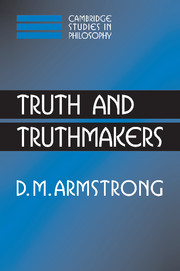Book contents
- Frontmatter
- Contents
- Preface
- 1 An introduction to truthmakers
- 2 The general theory of truthmaking
- 3 Epistemology and methodology
- 4 Properties, relations and states of affairs
- 5 Negative truths
- 6 General truths
- 7 Truthmakers for modal truths, part 1: possibility
- 8 Truthmakers for modal truths, part 2: necessity
- 9 Numbers and classes
- 10 Causes, laws and dispositions
- 11 Time
- References
- Index
3 - Epistemology and methodology
Published online by Cambridge University Press: 22 September 2009
- Frontmatter
- Contents
- Preface
- 1 An introduction to truthmakers
- 2 The general theory of truthmaking
- 3 Epistemology and methodology
- 4 Properties, relations and states of affairs
- 5 Negative truths
- 6 General truths
- 7 Truthmakers for modal truths, part 1: possibility
- 8 Truthmakers for modal truths, part 2: necessity
- 9 Numbers and classes
- 10 Causes, laws and dispositions
- 11 Time
- References
- Index
Summary
THE EPISTEMIC BASE
We have introduced the notion of a truthmaker, and discussed some of the formalities involved. But now we want to use it in metaphysics. This, however, brings up the question of the starting point. It is in virtue of truthmakers that truths are true, or so this essay argues. But in arriving at metaphysical results, it is truths, or, rather, it is what we take to be truths, that have to be our starting point. We take certain things to be true, and then ask what truthmakers these truths demand. It may be that at times we will think that we must have certain truthmakers, and as a result add to what we take to be our stock of truths. Or we might find ourselves unwilling to postulate certain truthmakers and therefore having to reject what we had previously taken to be truths. But, in general, in metaphysics the path is from supposed truth to truthmaker. So we need to consider at the beginning of a metaphysical investigation what we take to be true.
I suggest that in these circumstances it is reasonable to start by assuming truths in three areas: (1) the basic deliverances of common sense, what I call the Moorean truths, in recognition of the work of G. E. Moore; (2) secure results in logic and mathematics; (3) secure results in the natural sciences. We should now say something about these three bodies of truths.
- Type
- Chapter
- Information
- Truth and Truthmakers , pp. 26 - 38Publisher: Cambridge University PressPrint publication year: 2004



